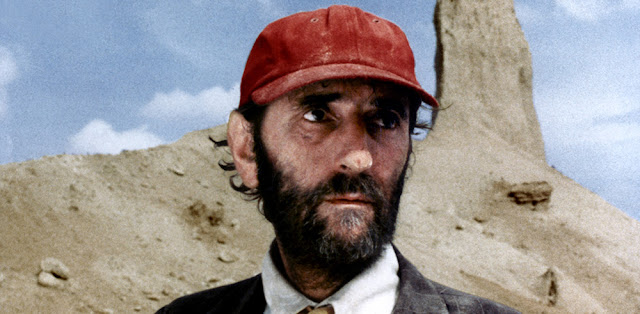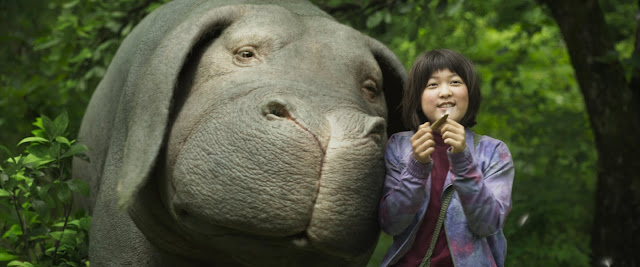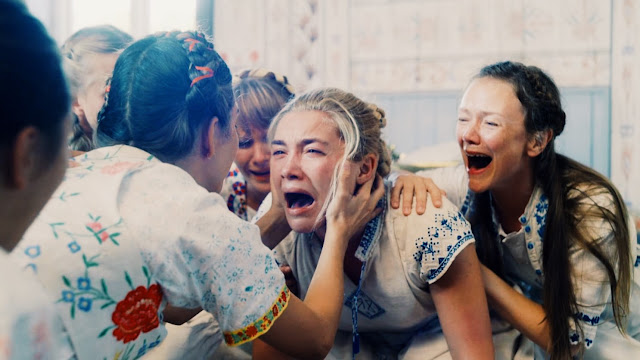Paris, Texas (1984)
FILM CLASSIC REVIEW #7
Lone Survivor - an analysis of Paris, Texas
Travis is our hero. At the beginning of the picture, you have no idea what to think of him. He is seen walking aimlessly in the desert, somewhere in the southern part of Texas. It's not clear as to where he is or why is he there, but he is still our hero. The mystique of his character really had me interested in the first half of the movie. No matter how much his estranged brother tried to have him express himself, Travis refused to, that is until he loses his cool. It's never really explained why Travis is so quiet, but my opinion is, that thanks to the situation of the loss of his family, perhaps the shame of it all led him to believe that he owed nobody any words. That's just one theory. But over some time, Travis begins speaking to his brother, from small fragments to actual sentences. His progression continues when he returns to his brother's house, where he meets his long lost son, and he begins to further unravel back into his personality. Travis's silence seemed like a protective cocoon, and walking aimlessly into the desert seemed to be a way of escaping his personal life. In the scene where his brother tells him that he will be returning to Los Angeles, Travis quickly escapes the hotel room and returns to wandering. Wandering, to many people, helps clear the mind. Travis seemed to use it, much less as a detox, and more as his refuge. The uncivilized world of nature became his home. The remainder of the movie is his assimilation back to the civilized world, and his return to speaking with his family.
The final 30 minutes of the film are what really entertain me, and what makes Paris, Texas a thoroughly fascinating experience. The shot that Wim Wenders holds on the character of Jane is the greatest shot in the film. As Travis says his soliloquy about the reason as to why he left, we see Jane slowly come to tears at the revelation of his words. Film is the one medium where photographing facial expressions is the most powerful, and the most effective at conveying emotions. I also really enjoyed that it took place inside a peep booth. What makes that so interesting to me is that the Peep Booth is an intimate setting, and Travis uses it as an intimate setting, but instead of getting off on a naked woman, he spills his soul out to her. This scene is the section of which I fell in love with the movie the most. It is the scene in which Travis's hero journey comes complete, as he reunited with his son, and reconciled with his wife. Paris, Texas is a western of forgiveness, and redemption. We even see our hero, Travis, ride off into the sunset, but instead of a horse, it's a car. He's off to be the loner again, but he's content in that he has finally accomplished something. He is no longer the reluctant, scared loner, but a loner that has done good. He corrected his mistakes, explained his guilt and decided honorably to make sure that his son is safe with Jane.
Paris, Texas is a wonderful little movie that made such a huge noise back in 1984. It is a testament to the power of independent cinema, and has inspired countless independent filmmakers to this day. It's simplicity and emotion resonates with nearly every viewer. Even if you found the picture slow, you could easily cite what your favorite moment was. That was the case with me. There were moments where the picture could have been much more entertaining, and Travis's reuniting with his son seemed to not resonate with me too much. But once I saw the final scene in the peep booth, I knew what I saw was a great film. It's funny what peep booths can do.
Lone Survivor - an analysis of Paris, Texas
What is your definition of the western? Is it the story of the gun-slinging "Clint Eastwood" type who comes into town to take out the bad guys, or is it something more complex? The answer is that the western by definition is the hero's journey, whether it is physical or mental. More often than not, this hero is alone, and without question, he turns out to be a different man than who he was at the beginning of the picture. Paris, Texas is a western. Unconventional at best, but nonetheless, the hero that Wim Wenders presents to us is perhaps the loneliest man in Texas (Travis), and by the end of the picture, he's a fully realized, beautifully spoken, saint-like human being. But should it be a surprise that Paris, Texas seems anything but a classic western? Wim Wenders is one of the great mold-breakers of international cinema, more specifically the father of the German New Wave. In the grand tradition of Antonioni and Goddard, Wim Wenders challenged the conventions of the cinema of his native land, and used the screen as the canvas for which to paint whatever was on his mind. I see most of these "New Wave" filmmakers as painters, or beatnik poets. They are always looking for something to say, and to find the art in anything they come across. But more importantly, Wenders's western, or whatever you'd like to call it, is arguably his masterpiece.
Paris, Texas is a wonderful little movie that made such a huge noise back in 1984. It is a testament to the power of independent cinema, and has inspired countless independent filmmakers to this day. It's simplicity and emotion resonates with nearly every viewer. Even if you found the picture slow, you could easily cite what your favorite moment was. That was the case with me. There were moments where the picture could have been much more entertaining, and Travis's reuniting with his son seemed to not resonate with me too much. But once I saw the final scene in the peep booth, I knew what I saw was a great film. It's funny what peep booths can do.





Comments
Post a Comment